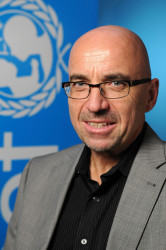Making the New Opportunity Corps (NOC) a last resort for children in contact with the law is one of the areas that found consensus yesterday during a meeting between United Nations Children’s Fund (UNICEF) Regional Director for Latin America and the Caribbean Bernt Aasen and three government ministers.
According to a press release from UNICEF, Aasen engaged Education Minister Dr Rupert Roopnaraine, Public Security Minister Khemraj Ramjattan and Indigenous People’s Affairs Minister Sydney Allicock on issues affecting children in Guyana, with special emphasis on violence. Also present at the meeting were UNICEF Representative for Guyana and Suriname Marianne Flach and technical officers from UNICEF and the respective ministries.
Welcoming the partnership with UNICEF, particularly on strengthening the institutional and individual capacity of the police to operationalise the Sexual Offences Act, Ramjattan pointed to the manifestations and deep interdependent nature of child rights and responsibilities including violence, given that the work on this cuts across several ministries, the release said.

He further noted a readiness to begin preliminary discussions on the draft Juvenile Justice Bill, as part of the preparations for Cabinet submission. He indicated that a few issues still needed to be fully discussed, including support for raising the age of criminal responsibility in Guyana from 10 years old, the removal of economic ‘crimes’ such as wandering, and the need to ensure that the justice system has the appropriate treatment for children who need care and protection; those who are found wandering, and those who are in contact with the law as offenders.
The release said Ramjattan also welcomed the support for the Sophia Holding Centre to benefit from UNICEF’s Sports and Culture for Development Programme, which would help Guyana to meet one of the minimum standards on the protection of juveniles deprived of their liberty. All ministers indicated the importance of having the family court operationalised.
Calling for the strengthening of partnerships between UNICEF and the ministries, Aasen suggested that national interventions should be consistent with the Caricom strategy, while noting that violence against children is common in the region. The release said he also noted the importance of creating linkages in the region and suggested that UNICEF could support exchange visits to countries that have demonstrated best practices in addressing certain issues.
According to the release, Aasen emphasised the importance of utilising bottom up approaches to create a change in culture towards corporal punishment, as policy and legislative changes alone are not sufficient.
Roopnaraine, the release said, agreed with the idea of promoting positive discipline and developing an all embracing approach, starting at the community level, and working with teachers and parents to create this culture change.
He indicated that significant interventions are proposed, such as the resuscitation of National Parent Teachers Associations, structured training for positive discipline in schools, technical and vocational education to match regional needs, a stronger base for counselling in schools through capacity development of schools’ welfare officers, and meaningful extracurricular activities in schools.
Acknowledging the importance of sports and culture in all schools, the release said the minister suggested that that the same strategy should be integrated in institutional settings, such as the NOC, and urged UNICEF to continue to support programming in this area. He also proposed an environmental audit of all schools so as to be able to plan adequately for safe and stimulating learning environments.
Allicock, the release said, spoke on the impact of the extractive industries on the environment and traditions of Guyana’s indigenous population, and pointed to the important role that the private sector could play to help further efforts for more responsible mining practices.
He also raised the issue of out-of-school children in the hinterland and possible ways to engage them, such as vocational education in the areas of forestry, tourism, mechanical engineering and other areas which they would find relevant and applicable in their communities
All of the ministers noted that there are significant gaps in data for decision making, and the need for studies—for example, a situational analysis on indigenous children—which would help to fill these gaps, and advance planned progress for children.
Flach said UNICEF would be happy to support such a study and she also gave an update on the Multiple Indicator Cluster Survey (MICS) which was conducted in 2014. The report which contains key indicators on children is currently being finalized.
Aasen expressed gratitude to the new government for its partnership and keen interest in advancing the rights of children in Guyana and committed UNICEF’s support for this process.




